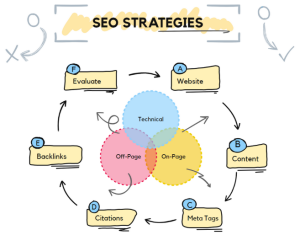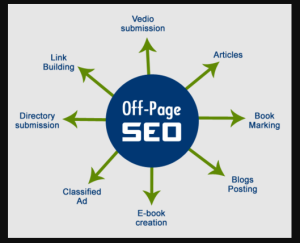
July 21, 2023, 2 Comments
Top 10 types of off-page SEO services for 2023
In order to have a successful digital marketing plan, off-page SEO is essential. You must go outside of your own site for SEO if you want to rank your website higher in Google and enhance brand visibility, and increase organic traffic. We will discuss off-page SEO in this article. Including its significance and the techniques you should employ to increase website traffic and growth.
Describe off-page SEO
In a nutshell, off-page SEO refers to all SEO efforts that are made to raise your website’s search engine ranks but take place elsewhere. Link building, content marketing, social media marketing, guest posting, podcasting, and video marketing are some of the popular off-site SEO techniques. Off-page SEO is any activity that doesn’t include creating content for your own website.

These signals let Google know how other people feel about your website. They enhance the authority and credibility of your website. Search engines will think you have excellent content when, for instance, many important websites link to your pages. The kind of content that users find valuable. Off-site SEO, according to Moz, grants a website authority, relevancy, and trustworthiness. All of which are crucial for the page’s potential to rank.
Consider it as:
- SEO on the page of your website
- Off-page SEO on another website
What makes off-page SEO so Important?
According to studies, the most important component of off-page SEO is backlinks.
Are you curious as to why?
The total number of backlinks and Google ranking were shown to be directly correlated in Backlinko’s study on the search engine ranking criteria for 2020. Google has verified that the PageRank algorithm is still used to determine rankings. The PageRank analyses the quantity and quality of links pointing to a certain online page.
Google also claims to rank websites using additional off-site SEO signals. You will find it difficult to outrank websites with more authority without off-page SEO. Usually, this explains why material from more reliable websites typically ranks higher than that from less reliable ones.

We are going to explore the list of common off-page SEO strategies that have been effective in driving organic traffic and improving search engine rankings. Keep in mind that trends and algorithms may evolve. So it’s essential to be aware of the latest SEO practices.
Here are ten types of off-page SEO services that are prominent as of 2023. You should be using them to drive success from SEO and to build your brand.
Top 10 types of off-page SEO services for 2023
Remember that successful off-page SEO depends on a combination of creativity, quality content and ethical practices. Always prioritize user experience and value when implementing off-page SEO strategies. Also, stay updated with the latest industry trends and search engine algorithm changes to adapt your approach accordingly.
1. Brand Building
Brand building is the process of creating and strengthening a brand’s identity, reputation and presence in the market. It involves developing a unique and consistent image that resonates with the target audience. Fosters trust and loyalty and sets the brand apart from its competitors. Successful brand building can lead to increased customer recognition, enhanced brand equity and long-term business growth.
-
Key Components of Brand Building:
Brand Identity: This encompasses the visual elements of the brand, such as logo, color palette, typography, and design. A strong and memorable brand identity helps customers easily recognize and remember the brand.
Brand Message: Defining a clear and compelling brand message is crucial. It should convey the brand’s values, mission, and what it stands for. This message should be consistent across all marketing channels and communication.
Target Audience: Understanding the target audience and their preferences is essential. Tailoring brand messaging to resonate with the right audience will create a stronger connection with potential customers.
Consistency: Consistency across all brand touchpoints is vital. Whether it’s the website, social media, packaging, or customer service, maintaining a consistent brand image reinforces its identity and builds trust.
Brand Experience: Every interaction a customer has with the brand contributes to their perception of it. Positive brand experiences lead to brand loyalty and advocacy.
Storytelling: Creating a compelling brand story helps humanize the brand and fosters emotional connections with customers.
Innovation and Adaptation: Brands that stay relevant and continue to innovate can maintain their appeal in a changing market.
2. Link building
Link building is a crucial aspect of search engine optimization (SEO) that involves acquiring hyperlinks from other websites to your own. These hyperlinks are also known as backlinks. Act as “votes of confidence” from other websites. Indicating to search engines that your content is valuable and worthy of being referenced. High-quality backlinks are essential for improving a website’s search engine rankings and increasing organic traffic.
Process of Link Building:
- Content Creation: The foundation of link building is high-quality and valuable content. Create content that is informative, engaging and relevant to your target audience. Content can include blog posts, articles, infographics, videos or any other format that provides value.
- Identify Linkable Assets: Once you have valuable content, identify specific pieces of content that could serve as linkable assets. These are pieces of content that are likely to attract links from other websites due to their uniqueness and depth or usefulness.
- Competitor Analysis: Conduct a competitor analysis to identify websites that are linking to your competitor’s content. Tools like Ahrefs, Moz, or SEMrush can assist in finding backlinks to your competitors’ sites.
- Outreach: Reach out to website owners, bloggers, journalists and influencers in your industry or niche. Personalize your outreach and explain why linking to your content would benefit their audience. Remember to be polite and not spammy in your approach.
- Guest Blogging: Offer to write guest posts for relevant and authoritative websites in your industry. Guest blogging allows you to showcase your expertise while earning a link back to your website in the author bio or content body.
- Linkable Asset Promotion: Actively promote your linkable assets through social media, email newsletters and outreach to relevant communities and influencers. The more people see your content the higher chances of it being linked to.
- Participate in Industry Events and Forums: Engage in industry events, webinars, conferences and online forums to establish yourself as an authority in your field. This can lead to natural backlinks from participants and community members.
- Create Infographics and Visual Content: Infographics and visually appealing content have a higher likelihood of being shared and linked to. Create informative infographics and share them on social media and relevant platforms.
- Submit to Directories and Resource Pages: Submit your website to relevant directories and resource pages. However, exercise caution and avoid spammy directories or pages with low-quality links.
Remember that link building is not about quantity alone but rather the quality and relevance of the backlinks. Building a strong and natural backlink profile requires patience and effort. A genuine focus on providing value to your audience and the online community. Avoid unethical practices like buying links or participating in link schemes. As they can lead to penalties from search engines and harm your website’s rankings.
3. Guest blogging
Guest blogging is a content marketing strategy. In which a writer creates and publishes content on another person’s blog or website. This practice allows guest bloggers to reach a wider audience. Build relationships with other industry players and earn valuable backlinks to their own websites. Which can improve their search engine rankings? This process is also called “Guest posting”.
Process of Guest Blogging:
- Identify Target Blogs: Start by identifying blogs or websites in your industry or niche that accept guest posts. Look for platforms with a relevant and engaged audience, and ensure they have a good reputation.
- Research Guest Posting Guidelines: Before reaching out to a potential blog, thoroughly read their guest posting guidelines. These guidelines provide specific information on the type of content they accept, preferred word count, writing style, and submission process.
- Craft a Pitch: After understanding the guest posting guidelines, craft a compelling pitch to the blog owner or editor. Your pitch should introduce yourself and briefly explain the topic you’d like to write about. Highlight this point, why your content would be valuable to their readers?
- Submit Your Proposal: Send your pitch or topic proposal to the blog owner or editor via email or their preferred method of communication. Make sure your email is professional and personalized to increase the chances of acceptance.
- Create High-Quality Content: If your proposal is accepted, begin creating your guest post. Write a well-researched and engaging article that aligns with the blog’s audience. Avoid promotional content and focus on providing value to the readers.
- Include a Bio and Backlink: In your guest post, include a brief author bio that introduces yourself and your expertise. You may include a link to your website or social media profiles in author bio. Additionally, you may include one or two relevant and contextual backlinks within the content that link back to your own website.
- Submit Your Post: Submit your completed guest post to the blog owner or editor according to their submission process. Be patient during the review process it may take some time for your post to be published.
Guest blogging can be a powerful strategy for expanding your online presence. Establishing yourself as an industry expert and improving your website’s SEO through backlinks from reputable sources. However, it’s essential to focus on providing valuable content. Also, maintaining ethical practices to ensure a successful and mutually beneficial guest blogging experience.
4. Content marketing
Content marketing is a way to connect with your audience by sharing helpful and interesting information. When you create content, like blog posts, videos, or social media posts. You want to provide value to your readers or viewers. The key to a successful content writing strategy is understanding your audience. What they want to learn or enjoy.
Once you know that you can write engaging and easy and understandable content that answers their questions. Be sure to use a friendly and relatable tone and always be authentic. It’s also essential to be consistent with your content. So your audience knows when to expect new posts. Remember, the goal is not just to sell something but to build trust and a strong connection with your audience through valuable content.
5. Influencer Marketing
Influencer marketing is a type of marketing strategy that involves partnering with individuals. Those who have a significant online following known as influencers, promote products, services or brands. These influencers have a loyal and engaged audience. Their recommendations and endorsements can sway the purchasing decisions of their followers. Influencer marketing leverages the influencers’ credibility and reach. To create authentic and relatable content that resonates with their audience. In turn, drives brand awareness and engagement and sales.
Key Benefits of Influencer Marketing:
- Increased Brand Awareness: Influencers have dedicated followers who trust their opinions. When an influencer promotes your brand. It can lead to a significant increase in brand visibility and awareness among their audience.
- Targeted Audience Reach: Influencers often specialize in specific niches, so you can collaborate with influencers whose audience aligns with your target demographic. This allows you to reach a relevant and engaged audience, increasing the chances of converting them into customers.
- Enhanced Credibility: Influencers are seen as authentic and trustworthy figures in their fields. When they endorse your brand it lends credibility and legitimacy to your products or services.
- Improved Content Creation: Influencers are skilled content creators and partnering with them. As a result high-quality and engaging content that showcases your brand in a unique and creative way.
- Increased Engagement: Influencers’ posts often generate high levels of engagement, including likes, comments, and shares. This heightened engagement can boost your brand’s visibility on social media platforms.
- Word-of-Mouth Marketing: Influencer recommendations are like word-of-mouth marketing on a larger scale. When an influencer shares their positive experience with your brand. It can create a ripple effect leading to more organic conversations about your products or services.
- Cost-Effective: Compared to traditional advertising channels influencer marketing can be cost-effective. Especially when considering the potential reach and impact of influencer-generated content.
- Flexible Collaboration: Influencer marketing offers a range of collaboration options, from sponsored posts and product reviews to long-term partnerships and brand ambassadorships. This flexibility allows brands to tailor their approach based on their specific goals and budget.
- Measurable Results: Many influencer marketing campaigns are trackable. Allowing brands to analyze data and measure the effectiveness of their campaigns in terms of reach and conversions.
By collaborating with the right influencers, brands can tap into a vast and receptive online community, ultimately driving business growth and success.
6. Social Media
Online platforms and websites that let users produce and share content are referred to as social media. Engage with others and interact with various communities and networks. These platforms enable users to connect and communicate with friends & family. Social media has become an essential part of life with billions of active users globally. It holds immense power as a marketing channel for businesses and individuals.
Relevant and Effective Social Media Platforms:
The most relevant and effective social media platforms for promoting off-page services may vary based on the specific industry and target audience. Some popular platforms that are generally effective for promoting off-page services include:
- LinkedIn: LinkedIn is a professional networking platform ideal for promoting B2B services and building industry connections. It is particularly useful for off-page services that target professionals, businesses, or decision-makers.
- Facebook: With billions of users, Facebook offers broad reach and diverse targeting options for various off-page services. It can be effective for both B2B and B2C services depending on the audience.
- Instagram: Instagram’s visual nature makes it suitable for businesses that can showcase their off-page services through photos and videos. It is particularly popular among younger audiences and lifestyle-focused industries.
- Twitter: Twitter’s fast-paced environment is excellent for real-time updates and engaging with customers or followers. It is beneficial for sharing content and promoting off-page services with trending topics.
- YouTube: For off-page services that can be demonstrated or explained through video, YouTube offers a powerful platform to reach a vast audience and showcase expertise.
- Pinterest: Pinterest is ideal for industries that can create visually appealing content and cater to a predominantly female audience.
- Quora and Reddit: While not traditional social media platforms, Quora and Reddit are question-and-answer communities where businesses can demonstrate expertise and provide value to potential customers seeking relevant information.
When choosing the most effective social media platforms for promoting off-page services. It is essential to consider the target audience and the type of content that engages them. Consistency and engagement are key to building a successful social media presence and effectively promoting off-page services.
7. Online PR (Public Relations)
Online PR is the practice of managing and promoting a company’s reputation and image through online channels and digital media platforms. It involves creating and distributing compelling content and engaging with the target audience. The goal of online PR is to enhance brand visibility, credibility and trustworthiness in the online sphere.
Why Online PR is Recommended for Off-Page SEO?
- Backlink Acquisition: One of the primary reasons online PR is recommended for off-page SEO is its potential to earn high-quality backlinks. These backlinks are valuable for SEO as search engines view them as endorsements of your website’s authority and relevance.
- Brand Exposure and Awareness: Online PR efforts can lead to increased brand exposure and awareness. When your brand gets mentioned in media articles and blog posts or social media discussions. it reaches a broader audience and drives more organic traffic to your website.
- Positive Reputation Management: Online PR allows you to manage your brand’s reputation proactively. By engaging with your audience and addressing any negative feedback or misconceptions promptly, you can maintain a positive online image.
- Influencer Partnerships: Online PR often involves building relationships with influencers in your industry. Partnering with influencers can amplify your brand’s reach and credibility, as their followers trust their recommendations.
- Content Promotion: Online PR professionals strategically promote your content across various digital channels, maximizing its visibility and reach. This can lead to more shares, engagements, and mentions, further boosting your off-page SEO efforts.
- Media Coverage: Being featured in reputable media outlets through online PR efforts can significantly increase your brand’s authority and trustworthiness in the eyes of both users and search engines.
- Social Media Impact: A strong online PR strategy can positively impact your social media presence. Engaging with your audience and influencers on social platforms can lead to increased followers, shares, and interactions, further strengthening your off-page SEO.
- Online Citations: As part of online PR efforts, your brand’s name, website, and contact information may get mentioned in various digital sources, such as local directories or industry-specific websites. These online citations contribute to your brand’s online presence and can positively impact local SEO efforts.
Online PR is recommended for off-page SEO because it complements and enhances your SEO efforts through backlink acquisition. By leveraging the power of online PR, improve their search engine rankings and establish themselves as reputable and authoritative players in their industry.
8. Linkable asset creation
Linkable asset creation is the process of developing high-quality and valuable content or resources. That is so compelling that other websites and online platforms naturally link to them. These linkable assets are pieces of content such as blog posts and infographics, videos and e-books. That provides significant value to the target audience. The goal is to create content that stands out from the competition and addresses the needs of the audience. As a result, it becomes a valuable resource worth referencing and sharing.
Linkable assets are an essential part of off-page SEO. As they attract organic backlinks from other websites. Improving the overall authority and visibility of a website in search engine rankings. By consistently creating linkable assets, businesses can enhance their online presence, drive more traffic and strengthen their position as authoritative sources in their industry.
9.Barnacle SEO
Barnacle SEO is a digital marketing strategy. That involves leveraging the authority and visibility of established and high-ranking websites to boost your own online presence and off-page SEO efforts. In the context of SEO, it means using well-known platforms and websites to gain exposure and drive traffic back to your own website.
How Barnacle SEO is Beneficial for Off-Page SEO?
- Authority Boost: By associating your brand or content with a high-authority website you can piggyback on its credibility. Which can enhance your brand’s reputation and authority in the eyes of search engines and users.
- Increased Visibility: When you “attach” your content to a well-ranking website. Your content gets exposure to a wider audience that already trusts and visits that platform regularly. This can lead to increased visibility and brand awareness for your own website.
- Enhanced Backlink Opportunities: Barnacle SEO allows you to obtain valuable backlinks from authoritative websites. When you contribute guest posts and comments or participate in discussions on reputable platforms. You have the chance to include links back to your website. Which can positively impact your off-page SEO efforts?
- Targeted Traffic: Leveraging Barnacle SEO on relevant platforms ensures that you reach an audience that is interested in your industry or niche. This targeted traffic is more likely to engage with your content and potentially convert it into customers.
- Cost-Effective Strategy: Barnacle SEO can be a cost-effective approach compared to solely relying on your website’s organic growth. Instead of competing with high-ranking websites, you can align yourself with them and enjoy the benefits they offer.
- Improved Brand Visibility: Associating your brand with well-known platforms and websites can lead to improved brand visibility. Leading to more brand recognition and recall among your target audience.
Points to Implement Barnacle SEO:
- Identify Relevant Platforms: Find authoritative websites, industry-specific forums, social media groups and directories that are relevant to your business or niche.
- Contribute Valuable Content: Create high-quality and informative content that is valuable to the platform’s audience. This content should showcase your expertise and provide solutions to the audience’s problems.
- Engage Authentically: Engage with the platform’s community genuinely. Contribute to discussions, respond to comments and build relationships with the audience and other contributors.
- Include Relevant Links: When allowed, include relevant links back to your website within your contributed content. Ensure the links add value to the reader and fit naturally within the context.
- Be Consistent: Consistently participate and contribute to the chosen platforms to build a sustainable presence and reap the long-term benefits of barnacle SEO.
By incorporating Barnacle SEO into your off-page SEO strategy. You can harness the power of established platforms and increase your website’s organic search rankings and overall online performance.
10. Podcasts
Podcasts are essential for off-page SEO services as they expand your reach to create backlink opportunities and provide valuable content that can be repurposed for various platforms. By integrating podcasts into your content marketing strategy. You can strengthen your off-page SEO efforts and establish a strong online presence for your brand.
Podcasts are essential for off-page SEO services for several reasons:
- Diversifying Content: Incorporating podcasts into your content marketing strategy diversifies your content offerings. It provides an alternative format to reach your target audience, appealing to auditory learners and individuals who prefer consuming content on the go.
- Expanded Reach: Podcasts can attract new audiences beyond your website visitors. When you distribute your podcast on various platforms like iTunes, Spotify, or Google Podcasts, you can tap into their existing user bases, increasing your brand’s exposure.
- Backlink Opportunities: Hosting a podcast can lead to backlink opportunities. Other websites and content creators may link to your podcast episodes or cite your expertise, bolstering your website’s off-page SEO through valuable backlinks.
- Guest Appearances: Participating as a guest on other podcasts allows you to reach new audiences and showcase your expertise. When you share valuable insights and knowledge, it encourages listeners to visit your website for more information, driving relevant traffic.
- Brand Authority and Thought Leadership: Hosting a podcast positions you as an authority in your industry. Consistently delivering valuable content and insights to your audience can establish you as a thought leader, enhancing your brand’s credibility and trustworthiness.
- Social Media Engagement: Podcasts can be shared on social media platforms, sparking conversations and encouraging audience engagement. This increased engagement can lead to more shares, likes, and mentions, ultimately enhancing your off-page SEO.
- Repurposing Content: Podcast content can be repurposed into blog posts, infographics, or social media snippets. By utilizing the content in various formats, you extend its reach and appeal to different audience segments.
Long-Term Value: Podcast episodes have a long shelf life. Once published, they remain accessible to new listeners over time, continuing to generate brand exposure and potential traffic to your website.






The Power of Digital Marketing: Connecting with Customers Online - HS Marketing
July 29, 2023[…] Content: Creating engaging and valuable content is paramount for SEO success. Search engines prefer pages with relevant, informative, and well-written […]
What are the 7 Steps of Content Marketing? - HS Marketing
August 4, 2023[…] SEO to make your content easier to find on search engines. Find the right keywords to use in your […]